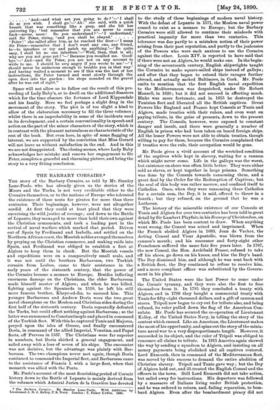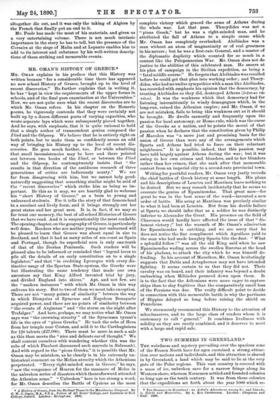THE BARBARY CORSAIRS.*
THE story of the Barbary Corsairs, as told by Mr. Stanley Lane-Poole, who has already given us the stories of the Moors and the Turks, is not very creditable either to the Corsairs themselves, or to the nations of Europe who tolerated the existence of these nests for pirates for more than three centuries. Their beginnings, however, were not altogether sordid. At first they could at least plead that they were exercising the wild justice of revenge ; and down to the Battle of Lepanto, they managed to more than hold their own against the Christian armaments, and took a leading part in the revival of naval warfare which marked that period. Driven
out of Spain by Ferdinand and Isabella, and settled on the Northern African coast, the Moorish nobles avenged themselves by preying on the Christian commerce, and making raids into Spain, and Ferdinand was obliged to establish a fort at Algiers to keep them in check. But the Moorish vessels and expeditions were on a comparatively small scale, and it was not until the brothers Barbarossa, two Turkish corsairs from Lesbos, came to their assistance in the early years of the sixteenth century, that the power of the Corsairs became a menace to Europe, Besides inflicting enormous damage on the Christians, the elder Barbarossa made himself master of Algiers; and when he was killed, fighting against the Spaniards in 1518, he left his still more famous brother, Kheyr-ed-din, to succeed him. This younger Barbarossa and Andrew Doria were the two great naval champions on the Moslem and Christian sides during the first half of the sixteenth century. Doria repeatedly defeated the Turks, but could effect nothing against Barbarossa ; so the latter was summoned to Constantinople and placed in command of the Turkish fleet. With this he captured Tunis and Majorca, preyed upon the isles of Greece, and finally encountered Doria, in command of the allied Imperial, Venetian, and Papal fleets, off Prevesa in 1537. The Christians were far superior in numbers, but Doria shirked a general engagement, and sailed away with a loss of seven of his ships. The encounter was not decisive, but the advantage was plainly with Bar- barossa. The two champions never met again, though Doria continued to command the Imperial fleet, and Barbarossa came to the assistance of Francis I. with a large fleet, when that monarch was allied with the Porte.
Mr. Poole's account of the most flourishing period of Corsair history down to the Battle of Lepanto is mainly derived from the volumes which Admiral Jurien de la Graviere has devoted
• The Barbary Corsairs. By Stanley Lane-Poole. With Additions by Lieutenant J. D. J. Kelley, U.S. Nary. London : T. Fisher Cowin. 1890.
to the study of these beginnings of modern naval history. With the defeat of Lepanto in 1571, the Moslem naval power ceased to exist as a menace to Europe; but the Barbary Corsairs were still allowed to continue their misdeeds with practical impunity for more than two centuries. This tolerance was due partly to a mistaken notion of their power arising from their past reputation, and partly to the jealousies of the Powers who were each anxious to use the Corsairs against the other. Louis XIV. is reported to have said that if there were not an Algiers, he would make one. In the begin- ning of the seventeenth century, English shipwrights taught the Corsairs to make square-sailed ships instead of galleys; and after that they began to extend their ravages further abroad, and actually sacked Baltimore, in Cork. Mr. Poole omits to mention that the first English naval expedition to the Mediterranean was despatched, under Sir Robert Mansell, in 1620; but it did not succeed in effecting much. Blake was more fortunate, and in 1655 he destroyed the Tunisian fleet and liberated all the British captives. Great Powers like England and France kept Consuls at Tunis and Algiers, made treaties with their rulers, and even went on paying tribute, in the guise of presents, down to the present century. The Consuls, however, were exposed to constant danger and insult, and there were generally a number of English in prison who had been taken on board foreign ships. All the lesser Powers were not able to obtain treaties, though willing to pay for them, because the Corsairs complained that if treaties were the rule, their occupation would be gone.
Mr. Poole gives a vivid account of the wretched condition of the captives while kept in slavery, waiting for a ransom which might never come. Life in the galleys was the worst, but existence on shore was often little better. They were either sold as slaves, or kept together in large prisons. Something was done by the Consuls towards ransoming them, and a great deal by the Order for the Redemption of Captives; but the zeal of this body was rather narrow, and confined itself to Catholics. Once, when they were ransoming three Catholics for a certain sum, the Dey, it is said, offered to throw in a fourth ; but they refused, on the ground that he was a Lutheran.
The history of the miserable existence of our Consuls at Tunis and Algiers for over two centuries has been told in great detail by Sir Lambert Playfair, in his Scourge of Christendom., on which Mr. Poole has been content to draw. When anything went wrong, the Consul was seized and imprisoned. When the French shelled Algiers in 1683, Jean de Vacher, the Acting Consul and Vicar Apostolic, was blown from the cannon's mouth; and his successor and forty-eight other Frenchmen suffered the same fate five years later. In 1767, the new Consul, the Hon. Archibald Fraser, refused to take off his shoes, go down on his knees, and kiss the Dey's hand. The Dey dismissed him, and although he was sent back with a British fleet, the Dey continued to refuse to receive him, and a more compliant officer was substituted by the Govern- ment in his place.
The United States were the last Power to come under the Corsair tyranny, and they were also the• first to free themselves from it. In 1785 they concluded a treaty with Algiers, and in 1799 they bought a commercial treaty with Tunis for fifty-eight thousand dollars, and a gift of cannon and stores. Tripoli now began to cry out for tribute also, and being refused, its ruler pulled down the flag of the American Con- sulate. Mr. Poole has secured the co-operation of Lieutenant Kelley, of the United States Navy, in telling the story of the contest which ensued. Like an American, the Lieutenant makes the most of his opportunity, and spins out the story of the minia- ture naval war to a very disproportionate length. However, it succeeded in its object, and the ruler of Tripoli was obliged to renounce all claims to tribute. In 1815 America again showed the way by sending a squadron to Algiers, and insisting on all money payments being abolished and all captives restored. Lord Exmouth, then in command of the Mediterranean fleet, was moved by this success to demand the entire abolition of Christian slavery. Tripoli and Tunis gave way ; but the Dey of Algiers held out, and ill-treated the English Consul and the officers in the town. Still Lord Exmouth did not take action, but sailed away for instructions. His departure was followed by a massacre of Italians living under British protection, and he was ordered to return, and, failing reparation, to bom- bard Algiers. Even after the bombardment piracy did not altogether die out, and it was only the taking of Algiers by the French that finally put an end to it.
Mr. Poole has made the most of his materials, and given us a very entertaining volume. There is not much intrinsic importance in the story he has to tell, but the presence of the Corsairs at the siege of Malta and at Lepanto enables him to add to its interest and substance by his well-written descrip- tions of these striking and memorable events.



































 Previous page
Previous page